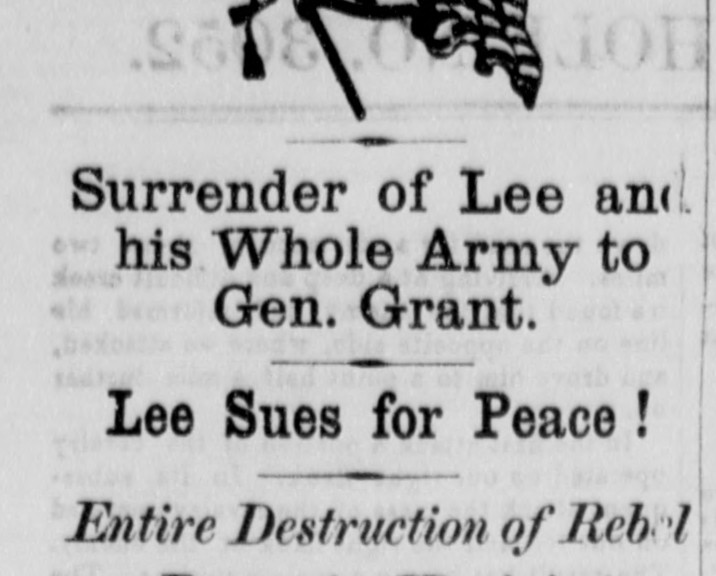“When this cruel war is over, praying then to meet again,” went the chorus of a popular Civil War song written by Henry Tucker in 1863. Those words encapsulated so much of what the war was to so many on the war front and at home: a seemingly endless period of waiting, worrying, and hoping. Yet the war in 1863 was only half over. The American Civil War stretched on and on, for four long, bloody years. The beginning of April 1865, though, 150 years ago, marked the Civil War’s decline with decisiveness.
Union victory seemed relatively assured after General Sherman’s March to the Sea in the autumn of 1864. By early 1865, the South did not have the numbers, nor the wealth or resources of the North, to sustain the rebellion much longer.
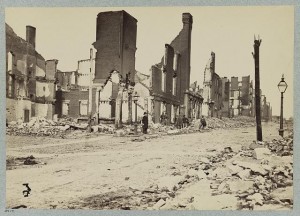
In the early spring of 1865, on April 3, Richmond, Virginia, the capital of the Confederacy, fell to Union troops. The Ninth Vermont Regiment was one of the first Union troops in the city–one soldier excitedly wrote of this moment to the Vermont Watchman and State Journal:
“Mr. Editor–Before this reaches you the telegraph will have announced the fact of the fall of Richmond!
….Another grand thing in the proud programme of April 3, 1865, is the fact that VERMONT WAS AHEAD! Indeed, such is the fact: for it was a portion of the 9th regiment Vt., vols. that first had the honor of unfurling its banner in the rebel capital of the defunct would-be confederacy… the fact nonetheless remains that the picket line of our brigade–one hundred men selected from the 9th Vt. as skirmishers…were first on the spot.” -“C.“ in a letter published on April 14, 1865
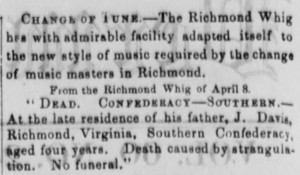
A few days later, the Civil War reached an informal end on Palm Sunday, the 9th of April, with Confederate General Robert E. Lee’s surrender to Lieutenant General Ulysses S. Grant at Appomattox Court House, Virginia. Read of Lee’s surrender in Grant’s Personal Memoirs.
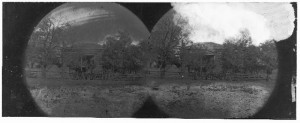
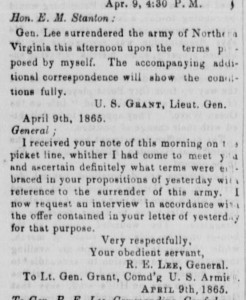
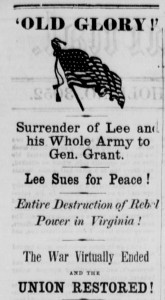
A Union-wide celebration commenced upon the news of Lee’s surrender. In Northfield, Vermont, upon the arrival of the mail train on Monday, “feet were busy carrying the joyful news from house to house; men threw up their caps, jumped, ran, wrestled, embraced each other, and hurrahed for everybody and everything…everything in the shape of a bell was run at 11 a.m…” Apparently, amid songs and speeches carrying into the evening, the town burned an effigy of Jefferson Davis; the town’s correspondent wrote in detail of his fiery demise, “There he hung, on a gallows…thus ended the career of this ambitious, misdirected, and wicked man.”
In Bellows Falls: “Guns, bells, horns and engines are making all the noise they can…the fire companies are parading the streets, and the public schools are also suspended, and the pupils are marching in the streets with banners.”
In the state’s capital, celebrations went long into the evening with speeches, songs, bells ringing, and bonfires being lit:
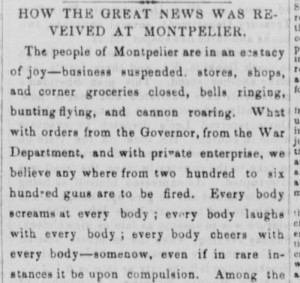
It was scarcely a week later, though, that the nation was to be shocked again and this time with devastating news: Abraham Lincoln had been assassinated on April 14th at Ford’s Theatre in Washington. Shot in the head by John Wilkes Booth, while attending a performance, Lincoln died in early hours of April 15th, 1865. Read an account of the assassination published on shortly thereafter in the news.
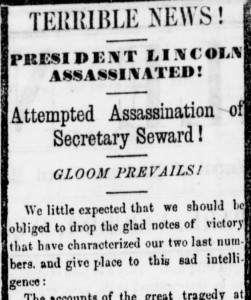
The war was not officially over, though–it would be some time more until the last Confederates surrendered. Soldiers currently serving would not begin to return to Vermont until mid-June, nearly two months after Lee’s surrender; and then even still, some Vermonters in the military would not be mustered out until March 1866.
On both sides, the soldiers were mainly volunteers. Close to three million fought for the Union, while 600,000 to 900,000 are estimated to have fought for the Confederates. Of those who fought for either side over 600,000 died of wounds or disease. Vermont sent just over 34,000 men to war; just over 5,000 would not return.
The war that divided a nation drew to an end; the Union was to be cobbled together again; and the tumultuous period known as Reconstruction began:
“‘When this cruel war is over’ we have something more to do than hold a jubilee: we have stern business on hand. Let us quit ourselves like men!” –The Christian Advocate, republished in the Lamoille Newsdealer, April 19, 1865
-K. Norwood, Digital Support Specialist
*********************************************************************
Newspapers on Chronicling America offer an unparalleled glimpse into the war as it happened from both the Northern and Southern perspectives. We have a number of Vermont titles published during the war, which often included letters from soldiers, correspondences of the military, accounts of battles, and enlistments:
Civil War period:
- The Caledonian.
- Burlington free press.
- The Vermont transcript.
- Lamoille newdealer.
- Orleans independent standard.
- Vermont watchman and State journal.
- Vermont phoenix.
- Spirit of the age.
Anti-slavery (some published before the war):

